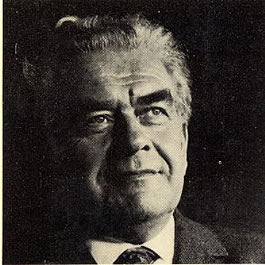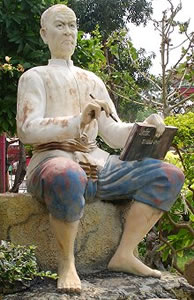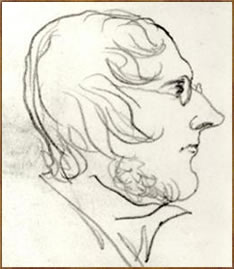De Nederlandse dichteres Jacqueline Elisabeth van der Waals werd geboren op 26 juni 1868 in Den Haag. Zie ook mijn blog van 26 juni 2007 en ook mijn blog van 26 juni 2008 en ook mijn blog van 26 juni 2009.
Liefdehonger
Ik heb zulk een honger naar liefde,
Toch spreek ik er niemand van.
Mijn hart is zo trots, dat ik niemand
Er iets van vertellen kan.
Waarom is dat hart zo hoogmoedig,
En toont het zijn armoede niet?
Men geeft toch zo graag van zijn weelde,
Als men honger en armoede ziet.
Eén enkele blik was voldoende,
Een blik, die ’t verlangen verraadt.
Een hand tot ontvangen geopend,
Een hart, dat zich weldoen laat.
Maar Hoogmoed verbiedt mij die houding,
Hij is voor een weigering bang
En dwingt mij zo rustig te lopen,
Met kalm, zelf genoegzame gang.
En ondertussen versmacht ik
Naar liefde. Maar waartoe die klacht?
De trots, die mij eenzaam doet lijden,
Die geeft ook tot lijden de kracht.
Wanklank
Dagelijks meer eerzuchtig
En minder in staat tot iets groots,
Telkens wanhopender roepend
Om kracht of de kalmte des doods,
Dagelijks vuriger wenschend
Naar schoonheid, gezondheid en vreugd,
Dagelijks ouder en bleeker,
En verder van blijdschap en jeugd –
Ik zit in de bloeiende velden,
Die schittren van zonneschijn,
En alles is jeugdig en vrolijk –
Ik schaam mij hier buiten te zijn!
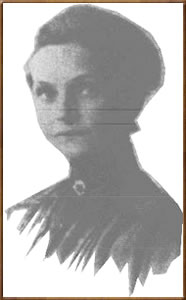
Jacqueline van der Waals (26 juni 1868 – 29 april 1922)
De Afrocaraïbische schrijver en politicus Aimé Césaire werd geboren op 26 juni 1913 in Basse-Pointe, Martinique. Zie ook mijn blog van 26 juni 2007 en ook mijn blog van 26 juni 2008 en ook mijn blog van 26 juni 2009.
Partir
Comme il y a des hommes-hyènes et des hommes-
panthères, je serais un homme-juif
un homme-cafre
un homme-hindou-de-Calcutta
un homme-de-Harlem-qui-ne-vote-pas
l’homme-famine, l’homme-insulte, l’homme-torture
on pouvait à n’importe quel moment le saisir le rouer
de coups, le tuer – parfaitement le tuer – sans avoir
de compte à rendre à personne sans avoir d’excuses à présenter à personne
un homme-juif
un homme-pogrom
un chiot
un mendigot
mais est-ce qu’on tue le Remords, beau comme la
face de stupeur d’une dame anglaise qui trouverait
dans sa soupière un crâne de Hottentot?
Tam-tam de nuit
train d’okapis facile aux pleurs la rivière aux doigts charnus fouille dans le cheveu des pierres mille lunes miroirs tournants mille morsures de diamants mille langues sans oraison fièvre entrelacs d’archet caché à la remorque des mains de pierre chatouillant l’ombre des songes plongés aux simulacres de la mer

Aimé Césaire (26 juni 1913 – 17 april 2008)
De Canadese schrijver Yves Beauchemin werd geboren op 26 juni 1941 in Rouyn-Noranda, Quebec. Zie ook mijn blog van 26 juni 2007 en ook mijn blog van 26 juni 2008 en ook mijn blog van 26 juni 2009.
Uit: Du sommet d’un arbre
22 février 1983
L’effet d’hélicoptère
Je devais avoir 8 ou 9 ans. C’était l’été. Le soir commençait à tomber. Je jouais dehors, devant la maison, avec mon frère et des amis, sur le chemin bordé de sable fin qui traversait le village. Le soleil couchant nous cuisait la peau. Nos cheveux étaient mouillés de sueur. J’entrai dans la cuisine prendre un verre d’eau.
Mon père ou ma mère avait installé sur notre nouveau combiné Électrohome – orgueil de la famille – la Cinquième de Beethoven dirigée par Toscanini. C’était encore l’époque des 78 tours. Je revois encore le gros album à couverture cartonnée qui contenait les quatre disques de la symphonie. Un artiste à tendances quelque peu hystériques l’avait illustré en aplats aux couleurs vives. Beethoven, l’air sinistre, se promenait courbé dans la tempête, les mains ramenées dans le dos. Derrière lui, la foudre venait de frapper un arbre noir et dénudé sur le haut d’une colline.
À mon irruption dans la cuisine, tout essouflé, la gorge comme du carton , à des milliers d’années-lumière de ce monsieur Beethoven de Vienne et de ses ennuis psycho-météorologiques, le deuxième mouvement commençait, cette espèce de marche solennellle, émouvante et recueillie que je me suis répétée dans ma tête des milliers de fois sans jamais me lasser. J’arrêtai net au milieu de la cuisine et, mine de rien, me mis à écouter. Jamais je n’avais rien senti de pareil. Je connaissais le plaisir de la lecture. Mais il s’agit d’un plaisir lent, qui se construit page après page en nous, indifférent à nos yeux affamés qui voudraient dévorer le livre d’un coup. Tandis que là…c’était l’extase…l’impression de posséder la terrre et les étoiles, de dépasser le temps…Une foule de choses mystérieuses,
d’une beauté incroyable, se déroulaient simultanément en moi….Un orchestre (je ne savais probablement pas à l’époque ce que ce mot voulait dire), cette machine humaine si puissante et si étrange, télécommandée par monsieur Beethoven de Vienne, racontait quelque chose d’infiniment simple et complexe à la fois, qui avait figé sur place dans son village d’Abitibi un petit garçon de 8 ans aux souliers remplis de sable.

Yves Beauchemin (Rouyn-Noranda, 26 juni 1941)
De Duitse schrijfster Elisabeth Büchle werd geboren op 26 juni 1969 in Trossingen, Baden-Württemberg. Zie ook mijn blog van 26 juni 2008 en ook mijn blog van 26 juni 2009.
Uit: Im Herzen die Freiheit
„Fröhliche Tanzmusik drang vom Park ins Foyer und lockte die neu eintreffenden Gäste hinaus. Das Klirren des Geschirrs und das glockenhelle Lachen einiger junger Frauen war bereits zu hören und die fröhlich tanzenden Lichter der im Park aufgehängten bunten Papierlampions, die bis in die Eingangshalle hineinschienen, taten ihr Übriges, um den beiden jungen Männern zu zeigen, wo sie erwartet wurden.
Der etwas Schmächtigere der beiden hängte seinen Hut an einen der dafür vorgesehenen Haken und fuhr sich mit beiden Händen durch die blonden Locken – ein vergeblicher Versuch, diese ein wenig zu bändigen. Sein Begleiter grinste ob dieser Bemühungen.
„André! Wunderbar, dass du es doch noch einrichten konntest, zur Hochzeit meiner Tochter zu kommen.“ Raphael Leroux kam auf die beiden zu. „Herzlich willkommen im Hause Leroux. Ich weiß, Dominique wäre sehr enttäuscht gewesen, wenn du ihrer Einladung nicht hättest nachkommen können.“
„Dominique sicherlich, Raphael. Doch wie sieht es mit ihrem Ehemann aus?“
„Wir müssen ihm ja nicht verraten, dass seine Frau jahrelang für dich geschwärmt hat, nicht wahr, André?“
„Lieber nicht. Ich möchte nicht, dass sich der glückliche Bräutigam gezwungen sieht, an seinem Hochzeitstag ein Duell auszufechten“, lachte André und wandte sich seinem Begleiter 60 zu, der das kurze Gespräch aufmerksam verfolgt hatte. „Du erinnerst dich sicher an Mathieu Bouchardon, Raphael?“
„Aber sicher! Madame Bouchardons Enkel. Herzlich willkommen in New Orleans und im Hause Leroux, Monsieur Bouchardon. Sie waren lange fort.“
„Das stimmt, Monsieur Leroux. Ich war beinahe noch ein Kind, als ich zu meiner Schwester und deren Familie nach New York gezogen bin.“
„Aber New Orleans lockt immer wieder, nicht wahr?“
„Die Stadt und natürlich auch meine Großmutter, die nicht mehr die Jüngste ist – wobei sie mir diese Bemerkung sicherlich nicht verzeihen würde, Monsieur.“
Raphael lachte und nickte. Mathieu Bouchardons Großmutter war im Vieux Carré* als sehr energische Frau bekannt.“
„Bitte, gehen Sie doch schon in den Garten. Ich muss noch kurz nach oben und nach meiner Frau sehen.“ Der Hausherr deutete einladend auf die offen stehende Terrassentür und verschwand dann über die Stufen in den oberen Stock.“
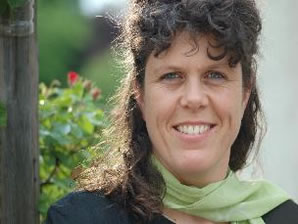
Elisabeth Büchle (Trossingen, 26 juni 1969)
De Engelse dichter en schrijver Laurence Edward Alan “Laurie” Lee werd geboren in Stroud, Gloucestershire op 26 juni 1914. Zie ook mijn blog van 26 juni 2007 en ook mijn blog van 26 juni 2008 en ook mijn blog van 26 juni 2009.
Apples
Behold the apples’ rounded worlds:
juice-green of July rain,
the black polestar of flowers, the rind
mapped with its crimson stain.
The russet, crab and cottage red
burn to the sun’s hot brass,
then drop like sweat from every branch
and bubble in the grass.
They lie as wanton as they fall,
and where they fall and break,
the stallion clamps his crunching jaws,
the starling stabs his beak.
In each plump gourd the cidery bite
of boys’ teeth tears the skin;
the waltzing wasp consumes his share,
the bent worm enters in.
I, with as easy hunger, take
entire my season’s dole;
welcome the ripe, the sweet, the sour,
the hollow and the whole.
Milkmaid
The girl’s far treble, muted to the heat,
calls like a fainting bird across the fields
to where her flock lies panting for her voice,
their black horns buried deep in marigolds.
They climb awake, like drowsy butterflies,
and press their red flanks through the tall branched grass,
and as they go their wandering tongues embrace
the vacant summer mirrored in their eyes.
Led to the limestone shadows of a barn
they snuff their past embalmed in the hay,
while her cool hand, cupped to the udder’s fount,
distils the brimming harvest of their day.
Look what a cloudy cream the earth gives out,
fat juice of buttercups and meadow-rye;
the girl dreams milk within her body’s field
and hears, far off, her muted children cry.
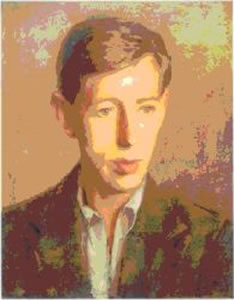
Laurie Lee (26 juni 1914 – 13 mei 1997)
De Amerikaanse schrijfster Pearl S. Buck werd geboren in Hillsboro West-Virginia, op 26 juni 1892. Zie ook mijn blog van 26 juni 2006 en ook mijn blog van 26 juni 2007 en ook mijn blog van 26 juni 2008 en ook mijn blog van 26 juni 2009.
Uit: Of Men and Women
“Curriculum subjects in themselves will have to be revised. History, for example, has always been taught as the work of man. When woman appears in it she is either a queen, of little practical use, or a rebel smashing up furniture or praying in saloons. The truth has never been told about women in history: that everywhere man has gone woman has gone too, and what he has done she has done also. Women are ignorant of their own past and ignorant of their own importance in that past. In curiosity a few months ago I asked a haphazard score of women of my acquaintance if they had heard of Elizabeth Cady Stanton. Only one had even heard her name, and she had no recollection of more. Yet only a generation ago Elizabeth Cady Stanton was called the greatest woman in the United States, and by some the greatest in the world. If women are as ignorant as this of themselves they can scarcely expect men to know more. But if the aim of education is to be enlightening of men and women about each other, of course history must be taught truthfully about both, and truthfully rewritten.
Psychology, as another example, should be taught with definite consideration of mental differences between men and women, with though given and research made over a space of time as to whether such differences are based upon physiology or environment, and whether they are permanent. There should be anxiety to prove nothing between men and women, but merely to discover the truth about each other. This new education of men and women for each other would remove the tedious rivalry which now poisons so much of the relationship between the sexes. Women need not be anxious to prove themselves superior to men, nor eager to prove all women inferior to men because they fear they themselves are inferior. And men need not be anxious to prove themselves superior to all women out of the fear that they are not. It will be taken for granted that such superiorities and inferiorities are to be found only in individuals and that no one is doomed by sex.“

Hier met een Welcome House adoptiekind in de jaren 1960
Zie voor nog meer schrijvers van de 26e juni ook mijn vorige blog van vandaag.

